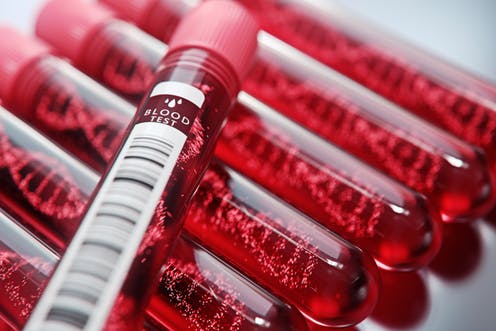Source: Thailand Medical News Aug 08, 2019 5 years, 11 months, 1 week, 1 hour, 2 minutes ago
A new type of liquid biopsy called TARDIS (TARgeted DIgital Sequencing) which is more than a hundred times sensitive than other blood based cancer monitoring tests has been developed jointly by the Mayo Clinic in Arizona and Translational Genomics Research Institute (TGen), for the detection and management of breast cancer. The new blood tests could help avoid thousands of unnecessary surgeries and otherwise precisely monitor disease progression

TARDIS is a "liquid biopsy" that specifically identifies and quantifies small fragments of cancer DNA circulating in an individuals’s bloodstream, known as circulating tumor DNA (ctDNA).TARDIS is able to detect ctDNA in as low as 2 parts per 100,000 in human blood, making it a very precise diagnostic tool.
In an exclusive interview with Thailand Medical News, senior author, Associate Professor Dr Muhammed Murtaza , co-director of Tgen said"By precisely measuring ctDNA, this test can detect the presence of residual cancer, and inform physicians if cancer has been successfully eradicated by treatment.TARDIS is precise enough to tell if early stage breast cancer patients have responded well to pre-operative drug protocols. It is more sensitive than the current method of determining response to drug therapy using imaging.”
This has enormous implications for women with breast cancer. This test could help plan the timing and extent of surgical resection and radiation therapy after patients have received pre-operative therapy. Unlike traditional biopsies, which only produce results from one place at one time, liquid biopsies use a simple blood draw, and so could safely be performed repeatedly, as often as needed, to detect a patient's disease status.
TARDIS is a game changer for response monitoring and residual disease detection in early breast cancer treated with curative intent. The sensitivity and specificity of patient-specific TARDIS panels will allow oncologists to tell very early, probably after one cycle, whether neo-adjuvant (before surgery) therapy is working and will also enable detecting micro-metastatic disease and risk-adapted treatment after completing neo-adjuvant therapy.
Following further clinical testing and trials, TARDIS could someday be routinely used for monitoring patients during cancer treatment, and discovering when patients are essentially cured and cancer free. The results of these tests could be used to individualize cancer therapy avoiding overtreatment in some cases and under treatment in others. Current tests and imaging lack the sensitivity needed to make this determination.
Fragments of ctDNA shed into blood by tumors carry the same cancer-specific mutations as the tumor cells, providing a way to measure the tumor.The problem is that ctDNA levels can be so low in non-metastatic cancer patients, there are often just not enough fragments of ctDNA in a single blood sample to reliably detect any one mutation. This is especially true in the residual disease setting, when there is no obvious tumor left during or after treatment. So, instead of focusing on a single mutation from every patient, the team decided to integrate the results of dozens of mutations from each patient.
The study results suggest that personalized ctDNA analysis, using TARDIS, is a promising approach to identifying patients with a curative response following pre-surgical drug therapy. Together with imaging and tissue-based predictive biomarkers, ctDNA is rapidly becoming a useful diagnostic test to determine individualized de
cisions about additional treatment.
TARDIS has the potential to really individualize clinical management of patients with non-metastatic cancer. Reliably identifying, often multiple, circulating tumor mutations in the plasma of patients with non-metastatic breast cancer also holds promise that ctDNA may one day be a great tool for early breast cancer detection.
TGen is now focused on evaluating the best partners to work with to automate and scale TARDIS, so it can be made available broadly to benefit patients in need.
Reference: B.R. McDonald el al., "Personalized circulating tumor DNA analysis to detect residual disease after neoadjuvant therapy in breast cancer,"
Science Translational Medicine(2019).
stm.sciencemag.org/lookup/doi/ … scitranslmed.aax7392
